Grain-Free vs Grain
Grain-Free Dog Food-Good or Bad? The Essential Guide for Pet Owners
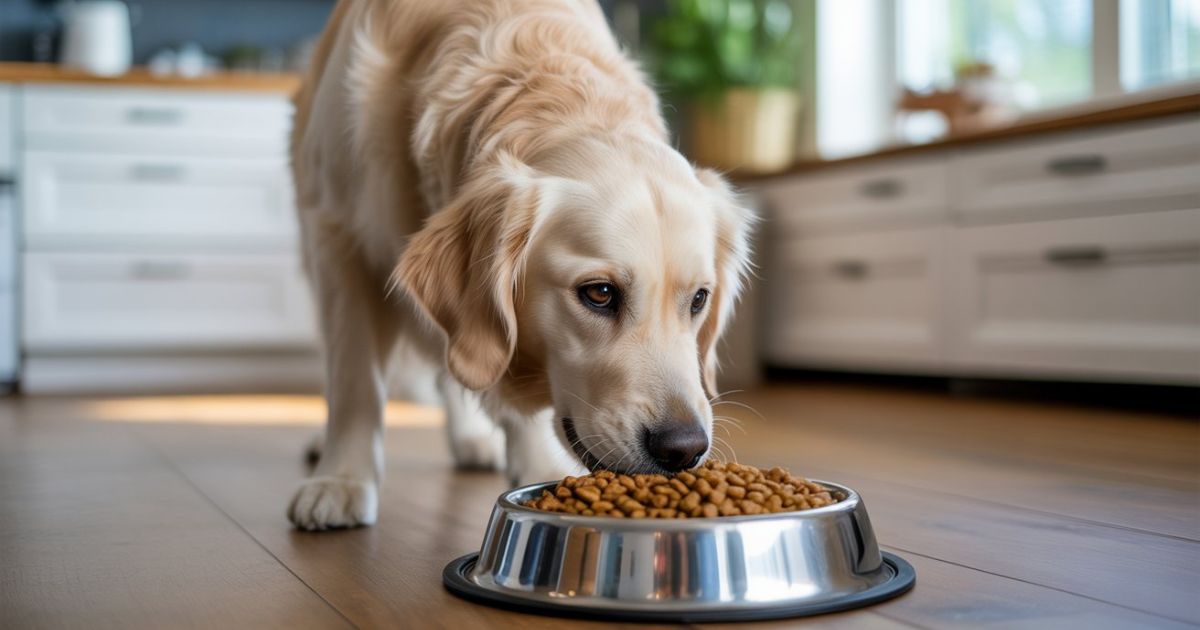
Introduction
When grappling with the question, “Grain-Free Dog Food: Is it good or bad?”, it is insightful to note that the question is nuanced. From the pet food industry to the holistic range of veterinary medicine, grain-free dog food diets are ubiquitous. The lingering inquiry is whether they present benefits or are there risks that lie concealed? This guide will take you step-by-step through all the important factors of grain-free dog food, what its positives and negatives are, and also show you how to make the most well-informed decision when it comes to choosing one that suits your dog.
What Does ‘Grain-Free Dog Food’ Mean?
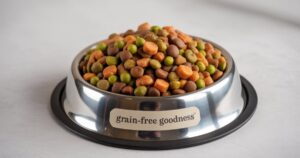
Grain-free dog food is simply the dog food that does not involve the use of grain in terms of wheat, corn, rice, barley, or oats. It is replaced with carbohydrates, or rather, potatoes, peas, or lentils. The diets that include grains are not fully devoid of their demerits, but can be rather balanced indeed, as they include not only grains but also the whole ones, which provide food with fiber, vitamins, and minerals. On the other hand, the grain-free diets are usually not formulated to include every other nutrient to make the so-called balance possible due to AAFCO standards of complete and balanced.
Benefits of Grain-Free Dog Food
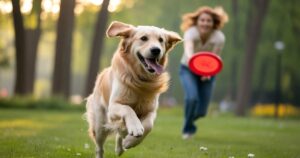
Allergy & Intolerance Relief

Grain sensitivity in our dogs can cause allergies, skin problems, and ear infections, as well as digestive issues. Such irritations can be alleviated through the use of grain-free dog food, and in many cases, they can work very well in bringing great relief.
Digestive Comfort & Quality Ingredients
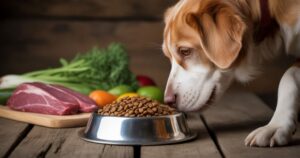
Grain-Free Dog Food diets provide alternatives to the carbohydrates that are more easily digested and do not include the “fillers” that are characteristic of grain-based formulas.
Holistic & Natural View
For numerous pet owners, the grain-free diet corresponds to the pre-industrial, protein-centric diets of canines, which emphasized meat instead of grains.
Potential Dangers of Grain-Free Dog Food

DCM Heart Problems
The FDA looked into the association of grain-free dog food, particularly those with high peas, with the heart disease dilated cardiomyopathy (DCM). Even without a concrete diagnosis, many patients report symptom relief after diet changes.
Nutritional Gaps
Elimination of grains may lead to a deficiency of fibrous nutrients and vitamins. Moreover, the substitute grains, peas, and potatoes may lead to an unbalanced diet if not properly planned.
Overemphasis on Peas and Lentils
The bad ones, which are, furthermore, emphasized in the diet, are peas, potatoes, and lentils, which have replaced grains.
So, is grain-free dog food beneficial or detrimental?
Like a lot in life, all is not black and white. Not an easy answer. In cases of recorded grain sensitivities or allergies, a grain-free dog food diet could vastly improve the quality of life of the dog. The majority of the rest of the canine population should be on a grain-inclusive diet that is regarded as healthy unless otherwise instructed by a veterinarian.
Guidelines for Selecting an Appropriate Grain-Free Diet

-
-
Look for the AAFCO stamp stating the food is “complete and balanced” certified.
-
Check the ingredients—meat (including fish) has to be the first listed and not peas, potatoes, or lentils.
-
Watch carb sources: avoid formulas where legumes or starch-laden fillers outnumber protein.
-
Never forget to always consult with your vet, especially when there is a big shift in your diet.
-
Under prolonged nutrient-free sampling of the dog, the symptoms of DCM, such as exhaustion, hacking, or other respiration complications, ought to be monitored.
-
Closing Remarks

For the discussion “Grain-Free Dog Food: Is it good or bad?”, the answer is determined by the individual health profile of the dog. Grainless foods can be beneficial, especially to dogs with specific sensitivities, but are not advantageous in other situations. The most correct response is to work toward an ingredient list that is well researched and balanced in nutrition and to vet suggestions. In case of any doubt, it is better to get professional assistance since the health of the dog can be best dealt with through wise feeding tactics. Lessons are learned in a healthier, happier way; tail wags begin with an informed approach to feeding.

Grain-Free vs Grain
Grain-Free Diet for Allergic Dogs: Key Benefits Every Dog Owner Should Know
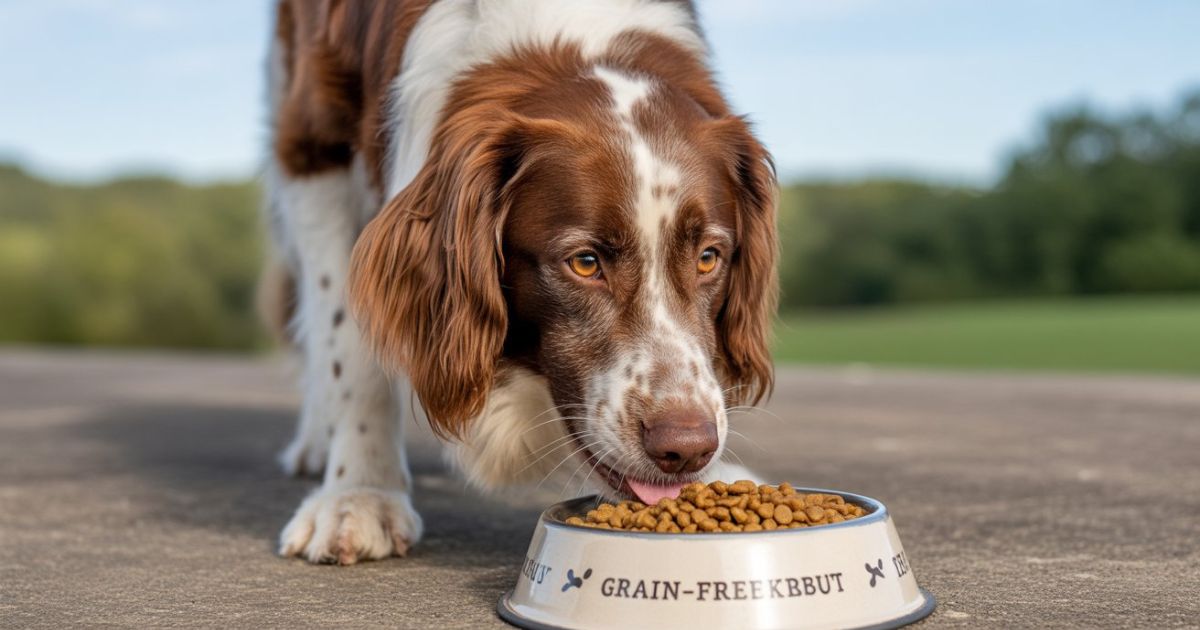
Introduction—The Impact of Diet on Dogs with Allergies
The diet of an allergic dog must be hypersensitive because their well-being can be compromised by a multitude of factors. Indeed, a dog with food allergies can face a multitude of problems, including skin rash, digestive problems, lethargy, and even chronic conditions. The dog owner’s adjustment made by the adoption of a grain-free diet is proving beneficial for the health of many dogs. However, is adopting a grain-free diet healthy for all allergic dogs? We will, in the following, analyze the positives and negatives of allowing dogs with allergies to go grain-free, and in turn, make a positive difference in their lives. Here, the Benefits of a Grain-Free Diet for Allergic Dogs become an important consideration.
Identifying Alerts of Food Allergies in Dogs

Dog food allergies are as common as almost any other ailment in Dogs. Suffering the allergies goes unnoticed in most cases; symptoms that are a bit too vague to conclude hypersensitivity are as follows:
-
-
Persistently intense scratching
-
Ear infections of a chronic nature
-
Gastrointestinal issues, diarrhea, and vomiting in pets
-
Inflamed and red skin
-
Listlessness paired with reduced physical activity.
-
The most prevalent of allergens are Beef, and dairy chicken, eggs, chicken, soy, and wheat are of common occurrence. A lot of the time, grains like corn and barley are the most common culprits. At this time, a grain-free diet for dogs will provide relief. Understanding this also connects to the Benefits of a Grain-Free Diet for Allergic Dogs.
What is a Grain-Free Diet for Dogs?
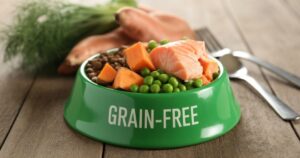
A grain-free diet for dogs equates to wheat, corn, barley, oats, and rice, and replacing them with sweet potatoes, soy, and barley. Tikus, peas, chickpeas, and lentils may also be included as substitutes for the grains. This aids with the abundance of proteins and petichous vegetables, balanced with optimal health, especially with dogs that are prone to allergies. Hence, pet owners often seek the Benefits of a Grain-Free Diet for Allergic Dogs.
Benefits of Adopting Grain-Free Diet for Allergic Dogs
A grain-free diet assists allergic dogs in a variety of ways. By grains, you eliminate at least one possible trigger for allergic reactions, thereby assisting your dog in avoiding ongoing discomfort. Now, let’s consider these various assists in more detail. The Benefits of a Grain-Free Diet for Allergic Dogs are quite evident here.
Better Digestion and Nutritional Absorption
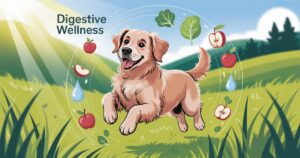
Enhanced digestion is one of the important advantages of going grain-free for dogs with allergies. Some grains can aggravate flatulence, bloating, and diarrhea. The substitution of grains with sweet potatoes and peas also improves digestion. Best of all, in addition to the improvement, sweet potatoes and peas augment nutrient absorption. Enhanced nutrient utilization improves overall holistic health and vitality in dogs. This shows the clear Benefits of a Grain-Free Diet for Allergic Dogs.
Improved Skin and Coat Health

Grain-free diets high in omega fatty acids from fish or flaxseed aid in replenishing dry, itchy, reddish, and even hotspot-covered skin. When grain is removed, dogs are able to get the required nutrition that helps in restoring skin problems. Pet owners report a significant reduction in skin problems in just a few weeks. Such results confirm the Benefits of Grain-Free Diet for Allergic Dogs.
Increased Energy and Vitality
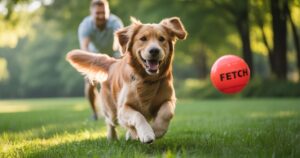
Your dog’s vitality can be reduced due to allergic reactions. Chronic fighting against inflammation from allergens and allergens results in diminished energy. Eliminating reaction-causing allergens aids your dog’s
immune system in focusing on maintaining overall health rather than contending with fighting allergens. As a result, your dog becomes more playful, aids, and happier. This again highlights the Benefits of Grain-Free Diet for Allergic Dogs.
Weight Management in Allergic Dogs
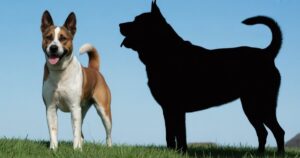
Some dogs have difficulty maintaining a healthy weight on a diet heavy in grains because of a high carbohydrate content. Eliminating grains from one’s diet tends to increase the consumption of protein, which helps to manage weight more effectively. In addition, a diet properly proportioned without grains may enhance the growth of lean muscle while decreasing excess body fat.
Considerations and Possible Downsides

Even though there are numerous benefits of grain-free diets for allergic dogs, here are some drawbacks worth considering:
-
-
Certain options are still overly carb-rich because of the inclusion of potatoes and peas.
-
Not all brands of grain-free dog food are of the same quality. Certain brands can offer very subpar quality.
-
Research continues to examine the relationship between grain-free diets and the incidence of DCM in dogs.
-
As the primary experts in pet medicine, veterinarians should be the first to be consulted when a pet’s significant change in diet is being considered, as pets often do not respond to such changes as their owners expect.
How To Shift Your Dog’s Diet To Be Grain–Free?
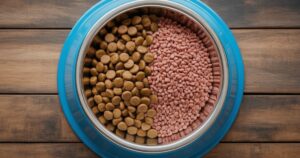
Most dog parents know their pets better than anyone; however, changing a dog’s diet unmonitored can be harmful and should not be done abruptly. To gradually change a dog’s diet, the following guidelines are provided:
-
-
Start with a mixture that is 25 percent grain-free and 75 percent of the previous food.
-
Increase the proportion of new food incrementally every 3 to 4 days.
-
Monitor appetite, stool, energy levels, and other relevant changes.
-
In two weeks, any dog should be completely transitioned.
-
Suggested Grain-Free Foods for Your Dog
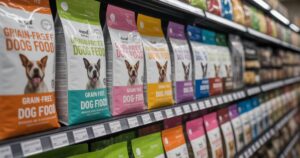
When looking for appropriate food without grains, consider looking for:
-
-
Clear-cut pet proteins, for instance, chicken, salmon, and lamb.
-
Formulas with a few ingredients to shield from potential allergens.
-
Processed food should contain omega fatty acids for skin health.
-
Processed food should not contain any artificial colors, flavoring, or preservatives.
-
It cannot be stressed enough, handling labels with extra care is important. Marked “grain-free” does not ensure a business’s food quality.
Frequently Asked Questions

1. Is grain-free food suitable for all dogs?
Not all dogs. Only dogs with existing allergies or hypersensitivities to grains will benefit the most.
2. Will it help with allergies?
These techniques help manage the symptoms; however, the allergies will not be treated without eliminating other triggers.
3. Can puppies eat grain-free food?
Yes, puppies can, but they should be specially formulated to better support their growth and development.
Conclusion – Is Grain-Free Suitable for Your Allergic Dog?

For allergic dogs, a grain-free diet can potentially promote better digestion, enhance skin and coat health, and improve overall vitality. Naturally, not all dogs might benefit from such a diet. Careful monitoring, veterinary advice, and suitable grain-free food especially crafted for the dog will give the best results. This way, a dog’s health and well-being can improve optimally. In summary, the Benefits of Grain-Free Diet for Allergic Dogs prove valuable for many pet owners.
-
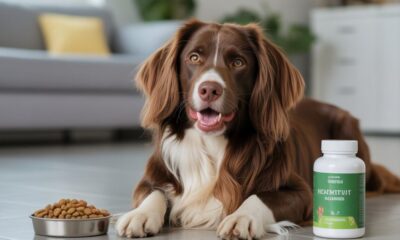
 Enzyme Support5 months ago
Enzyme Support5 months agoHow to Improve Your Dog Digestive Health with Enzyme Supplements | Complete Guide
-
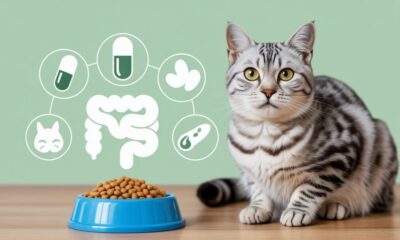
 Probiotics5 months ago
Probiotics5 months agoVet-Recommended Probiotics for Cats with Digestive Issues | A Guide to Better Gut Health
-
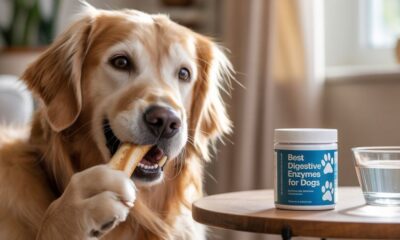
 Enzyme Support6 months ago
Enzyme Support6 months agoBest Digestive Enzymes for Dogs: Vet-Recommended for Digestion & Gut Health
-

 Grain-Free vs Grain6 months ago
Grain-Free vs Grain6 months agoGrain-Free Diet for Allergic Dogs: Key Benefits Every Dog Owner Should Know
-
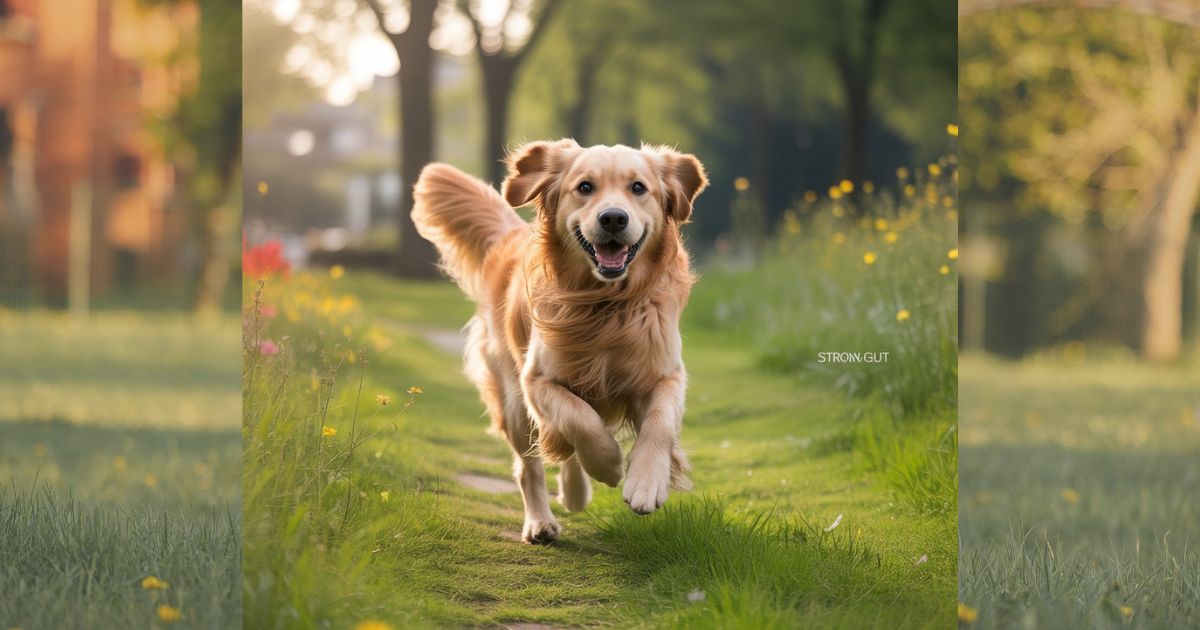
 Probiotics6 months ago
Probiotics6 months agoBoost Your Dog Gut Health Naturally: How Probiotics Work Wonders
-

 Cat Health5 months ago
Cat Health5 months agoBest Fish Oil Supplements for Cats — Vet Picks Made Easy with Omega-3 Benefits
-
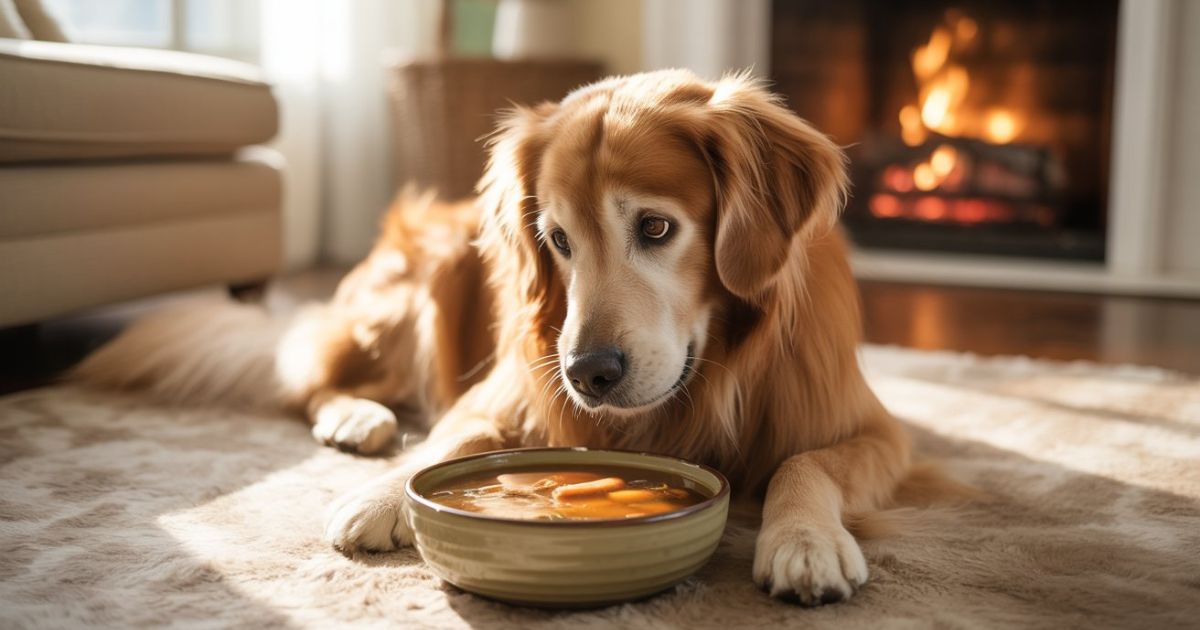
 Bone Broth6 months ago
Bone Broth6 months agoBone Broth for Senior Dogs – Boost Joint Health and Mobility Naturally
-
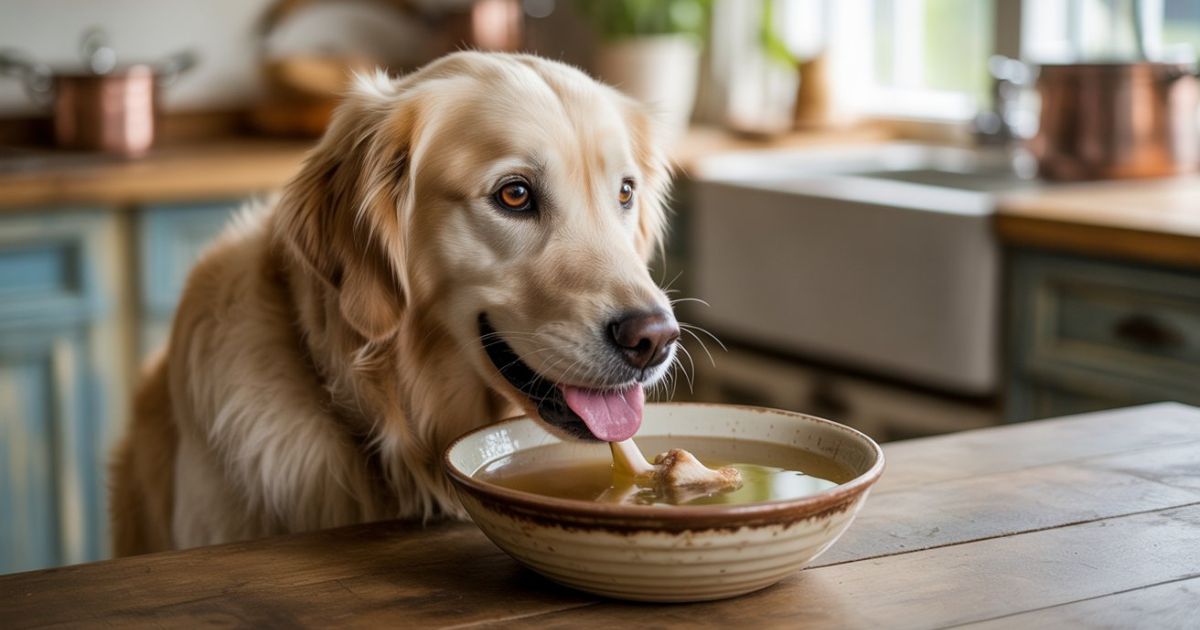
 Bone Broth6 months ago
Bone Broth6 months agoBest Bone Broth Recipe for Dogs with Sensitive Stomachs—Gentle & Homemade


